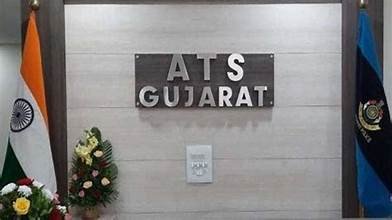Ahmedabad, Nov 10 (PMI) In a major counter-terrorism breakthrough, the Gujarat Anti-Terrorism Squad (ATS) has arrested three suspected ISIS operatives, including a Hyderabad-based doctor, who were allegedly plotting a large-scale terror attack using chemical and biological weapons.
The main accused, Dr. Ahmed Mohiyuddin Saiyed, 35, a qualified medical practitioner, had been conducting experiments to produce ricin, one of the most deadly natural toxins known to science. Officials say he was in the advanced stages of weaponising the chemical for use in a potential attack.
According to the ATS, the arrests were made following specific intelligence inputs from central agencies indicating that a small terror module was operating across Gujarat, Uttar Pradesh, and Telangana with possible links to ISIS and its Khorasan Province branch (ISKP).
Reconnaissance of Public Markets and RSS Office
Investigations revealed that Dr. Saiyed had spent the last six months conducting reconnaissance of high-density public areas and sensitive establishments. His primary focus, officials said, was on crowded food markets where an attack could cause maximum casualties and panic.
The doctor visited and surveyed Delhi’s Azadpur Mandi, Asia’s largest fruit and vegetable wholesale market, Ahmedabad’s Naroda fruit market, and even the RSS office in Lucknow. These sites were under consideration as potential targets due to their large crowds and symbolic importance.
ATS sources said Saiyed meticulously studied security arrangements, crowd movements, and peak hours at these locations. His phone and laptop data reportedly contain photographs, maps, and hand-drawn layouts of some sites, indicating detailed planning.
Ricin Experiments and Chemical Procurement
Ricin, derived from the seeds of the castor oil plant, is a highly toxic protein that can cause death if inhaled, ingested, or injected in very small quantities. It has no known antidote.
Gujarat ATS officials stated that Dr. Saiyed had already begun experimental production of the toxin.
In a statement, the ATS said:
“To execute a major terrorist attack, Dr. Ahmed Mohiyuddin Saiyed was preparing a highly lethal poison known as Ricin. He had acquired research equipment, chemicals, and four litres of castor oil to extract the toxin. Initial chemical processes had already begun at his private premises.”
The agency added that Saiyed had collected literature on toxicology and biochemical warfare, and downloaded several manuals from the dark web outlining methods for the extraction and delivery of ricin in aerosol or food-based forms.
Arms, Chemicals, and Radical Links Seized
The operation, conducted near Adalaj in Gandhinagar, led to the recovery of a large cache of weapons and chemicals.
Officials seized:
-
Two Glock pistols
-
One Beretta pistol
-
30 live cartridges
-
Four litres of castor oil
-
Laboratory glassware, centrifuge tubes, and chemical reagents
The ATS stated that the seized castor oil was intended for the extraction of ricin, while the pistols and ammunition were likely procured for protection and operational use.
Investigators also found that Saiyed, who completed his MBBS degree from a medical university in China, had been in constant contact with an ISKP handler named Abu Khadim. Encrypted chats recovered from his devices revealed discussions about fund collection, recruitment of local youths, and the planning of terror attacks.
Two Accomplices from Uttar Pradesh Arrested
Along with Dr. Saiyed, two others — Azad Suleman Sheikh (20) and Mohammad Suhail Mohammad Saleem (23) — both residents of Uttar Pradesh — were arrested in coordinated operations in Lucknow and Prayagraj.
According to investigators, the two men were actively radicalised through online ISIS propaganda channels and were tasked with logistical support and fund transfers. They allegedly received instructions from foreign handlers through encrypted messaging apps.
Part of a Larger ISIS Network
The Gujarat ATS believes this cell was part of a wider ISIS-linked network functioning in multiple Indian states.
Preliminary interrogation suggests that several sleeper cells may still be active in Maharashtra, Telangana, and Karnataka, connected through digital communication networks.
ATS DIG Sunil Joshi said:
“Dr. Ahmed Mohiyuddin Saiyed is a highly educated yet deeply radicalised individual. He had made concrete plans to collect funds, recruit operatives, and execute a major terrorist act using ricin poison and firearms. His arrest has averted a potential catastrophe.”
Further Investigation Underway
All three accused have been booked under provisions of the Unlawful Activities (Prevention) Act (UAPA) and relevant sections of the Indian Penal Code. They are currently being interrogated by a joint team of the Gujarat ATS, National Investigation Agency (NIA), and central intelligence units.
Officials said efforts are ongoing to identify foreign links, financial transactions, and any additional operatives connected to the group. Forensic teams are also analysing the seized substances to confirm the presence of ricin or its derivatives.
Authorities have not ruled out the possibility that the accused were planning to test the toxin in small quantities before carrying out a mass-casualty attack in a crowded market.
A senior ATS officer said,
“This case underlines a disturbing trend — the use of scientific knowledge for extremist purposes. It’s a wake-up call for institutions to monitor radicalisation even among highly educated professionals.”
Background: Ricin and Its Lethality
Ricin is classified as a Schedule 1 chemical weapon under the Chemical Weapons Convention. Even a few milligrams can kill an adult within 36 to 72 hours if exposure occurs without treatment.
Historically, ricin has been used in assassination attempts, most notably in the 1978 murder of Bulgarian dissident Georgi Markov in London.
Experts, however, note that while the extraction of ricin from castor seeds is relatively easy, weaponising it for large-scale attacks is technically difficult due to its instability and traceability.
Security Agencies on High Alert
Following the arrests, security has been tightened at major public markets, transportation hubs, and religious gatherings across several states. Intelligence agencies are on alert for any similar radical modules attempting to use biological or chemical means for terror activities.
The Gujarat ATS has described the case as one of the most significant counter-terror operations in recent years, crediting timely intelligence sharing and inter-agency coordination for preventing what could have been a devastating attack. (pressmediaofindia.com)
 Pressmediaofindia
Pressmediaofindia






